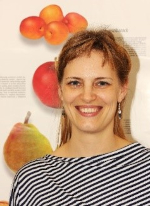Horticultural Plant Genetics Group - Detailed - Institute of Genetics and Biotechnology
Horticultural Plant Genetics Group
Horticultural Plant Genetics Group - Detailed
Last modified: 12. September 2025
Detailed presentation of the group
The team is working on the genetic characterization of horticultural crop plants, which includes both fundamental and applied research tasks. The group consists of two university professors, an associate professor, a lecturer (on maternity leave), six PhD students, more than ten students, a laboratory assistant and a research assistant.
Molecular study of the system that determines sexual (in)compatibility of stone fruit species was launched in 2003. Our research team has achievements for the fruit species of apricots, peaches, Japanese plum, almonds, cherries and apples, and has also started to study other plant species (e.g. the polyploid sour cherry and European plum). We have determined the S-genotypes of more than 100 cultivars, and identified cross-incompatibility groups in several species, which is widely used in practice to design orchards or parental combinations in breeding programs. We have earned some international reputation in this field, and our colleagues are regularly invited lecturers at international symposia.
A few years ago, we found that apricot self-compatibility is caused by the insertion of a transposon into a gene responsible for the rejection of self-pollen tubes. Further structural and functional characterization of this Mutator-type, non-autonomous transposon described by us is still an important research goal.
Research on medicinal plants focuses on the species Rhodiola rosea, but the study of thyme, lemon balm, basil and poppy is also important. In addition to identifying genes involved in the biosynthesis of bioactive substances of species and characterizing their expression, describing the genetic variability (SSR, ISSR, SCoT, transposon-based markers, chloroplast markers) and testing different evolutionary scenarios based on it are also important objectives. For the above-listed medicinal plant species, we maintain tissue cultures, examine the response of different genotypes to different hormone combinations, and develop a protocol for plant regeneration of the Rhodiola rosea species.
The group keeps a gene bank collection consisting of nearly 300 genotypes at the Soroksár experimental farm. The most important task of the germplasm collection is to preserve this rich gene pool, mainly in case of apricots (to a lesser extent almonds, peaches, and grapes). This collection forms the basis of the research programs currently running in the department.
Brief presentation of research topics
- Topic 1: Identification and characterization of DNA polymorphisms influencing economically important traits in diploid and polyploid stone fruit trees (linkA)
- Topic 2: Molecular genetics study of the self-incompatibility in stone fruit species (linkB)
- Theme 3: Characterization of the Falling Stones transposon (linkC)
- Topic 4: Exploring the glycoside biosynthesis pathways of Rhodiola rosea
- Topic 5: Characterization of medicinal plants using molecular markers
Main publications of the research group:
Identification and Molecular Analysis of Putative Self-Incompatibility Ribonuclease Alleles in an Extreme Polyploid Species, Prunus laurocerasus L.
Halász, J.*, Molnár, A. B., Ilhan, G., Ercisli, S., Hegedűs, A.
Front. Plant Sci, 12. (2021). doi: 10.3389/fpls.2021.715414. IF 5,753 D1
LC–MS based metabolic fingerprinting of apricot pistils after self-compatible and self-incompatible pollinations.
Lénárt, J., Gere, A., Causon, T., Hann, S., Dernovics, M., Németh, O., Hegedűs, A., Halász, J.*
Plant Mol. Biol. 1-13. (2020). doi: 10.1007/s11103-020-01098-5. IF 4,076 D1
Identification, structural and functional characterization of dormancy regulator genes in apricot (Prunus armeniaca L.).
Balogh, E., Halász, J., Soltész, A., Erős-Honti, Z., Gutermuth, A., Szalay, L., Höhn, M., Vágujfalvi, A., Galiba, G., Hegedűs, A.*
Front Plant Sci. 2019 Apr 5;10:402. doi: 10.3389/fpls.2019.00402 IF 4,407 D1
Production of cinnamyl alcohol glycosides by biotransformation in roseroot callus cells.
Mirmazloum, I., Kiss, A., Ladányi, M., György, Z.*
Plant Cell Tiss Organ Cult, (2019). 139(1), 29-37. doi: 10.1007/s11240-019-01659-7 IF 2,196, Q1
Genetic variability is preserved among strongly differentiated and geographically diverse almond germplasm: An assessment by simple sequence repeat markers.
Halász, J.*, Kodad, O., Galiba, G.M., Skola, I., Ercisli, S., Ledbetter, C.A., Hegedűs, A.
Tree Genet. Genomes 15: 12. (2019). doi: 10.1007/s11295-019-1319-8 IF 2,175 D1
Identification of a novel UDP- glycosyltransferase gene from Rhodiola rosea and its expression during biotransformation of upstream precursors in callus culture.
Mirmazloum, I., Ladányi, M., Beinrohr, L., Kiss-Bába, E., Kiss, A., György, Z.*
Int J Biol Macromol. 2019 Sep 1;136:847-858. doi: 10.1016/j.ijbiomac.2019.06.086. IF 5,162, Q1
Intercontinental migration pattern and genetic differentiation of arctic-alpine Rhodiola rosea L.: A chloroplast DNA survey.
György Z*, Tóth EG, Incze N, Molnár B, Höhn M.
Ecol Evol. 2018 Nov 23;8(23):11508-11521. doi: 10.1002/ece3.4589. IF 2,415 Q1(D1)
Identification of a recently active Prunus-specific non-autonomous Mutator element with considerable genome shaping force.
Halász J., Kodad O., Hegedűs A.*
Plant J. 2014 Jul;79(2):220-31. doi: 10.1111/tpj.12551. IF 6,815, D1
Origin and dissemination of the pollen-part mutated SC-haplotype that confers self-compatibility in apricot (Prunus armeniaca).
Halász, J., Pedryc, A., Hegedűs, A.*
New Phytol. 2007;176(4):792-803. doi: 10.1111/j.1469-8137.2007.02220.x. IF 5,249 D1
New self-incompatibility alleles in apricot (Prunus armeniaca L.) revealed by stylar ribonuclease assay and S-PCR analysis.
Halász, J., Hegedüs, A.*, Hermán, R., Stefanovits-Bányai, É., Pedryc, A.
Euphytica 145, 57–66 (2005). https://doi.org/10.1007/s10681-005-0205-7 IF 0,884 Q1
Main projects of the group:
- Identification and characterization of DNA polymorphisms influencing economically important traits in diploid and polyploid stone fruit trees (NKFIH K 128874), (principal investigator: Dr. Hegedűs Attila, 2018-2022)
- Investigation of the genetic background of the glycoside biosynthesis in roseroot (NKFIH FK128793) (principal investigator: Benyóné György Zsuzsanna, 2018-2022.)
- Biological protection against aphids in apple orchards – new approaches (NKFIH K129311), (principal investigator: Dr. Markó Viktor, 2018-2022, Benyóné Dr. György Zsuzsanna researcher)
- ELKH-MATE cooperation “Precision breeding for safe food raw materials” (Eötvös Lóránd Research Network) (researchers: Dr. Hegedűs A., Dr. Halász J.), (2020-)
Members of the group

|
Dr. Halász Júlia, professor M.Sc.: horticultural engineer, English translator, SZIE, Kertészettudományi Kar, 2003 Phone: +36-1/305-7100 / 6102 |

|
Benyóné Dr. György Zsuzsanna, professor M.Sc.: horticultural engineer, English translator, SZIE, Faculty of Horticultural Science, 2001 Phone: +36-1/305-7530 |

|
Kerekes Adrienn, lecturer M.Sc.: Agricultural biotechnology MSc., SZIE, Mezőgazdasági-és Környezettudományi KarKar, 2013 Phone: +36-1/305-7100 / 6230 |

|
Hermán Rita, kutatási assistant Phone: +36-1/305-7100 |
|
|
Gyurkó Adrienn Phone: +36 1/305 7267 |
|
|
Szilágyi Sámuel Phone: +36 1/305 7230 |
|
|
Szendy Gergő Phone: +36 1/305 7267 |

|
Chikhi Melisa, assistant Phone: +36-1/305-7100 |
Cooperations with MATE IGBI researchers
| Havelda Zoltán | Department of Plant Biotechnology, Plant Physiology and Developmental Biology |
Cooperations outside MATE IGB
| Várallyay Éva | Institute of Plant Protection |
| Markó Viktor | Institute of Plant Protection |

